Škorpion
The Škorpion vz. 61 is a Czechoslovak machine pistol developed in 1959 by Miroslav Rybář (1924–1970) and produced under the official designation Samopal vzor 61 ("submachine gun model 1961") by the Česká zbrojovka arms factory in Uherský Brod from 1963 to 1979.
| Škorpion vz. 61 | |
|---|---|
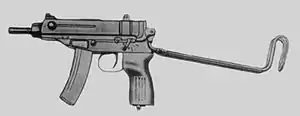 The early vz. 61 with stock extended. | |
| Type | Machine pistol Submachine gun Personal defense weapon |
| Place of origin | Czechoslovakia |
| Service history | |
| In service | 1961–present |
| Used by | See Users |
| Wars | Vietnam War Lebanese Civil War The Troubles Internal conflict in Peru Yugoslav Wars First Liberian Civil War |
| Production history | |
| Designer | Miroslav Rybář |
| Designed | 1959 |
| Manufacturer | Česká zbrojovka Uherský Brod, Zastava Arms[1] |
| Produced | 1963–1979 |
| No. built | Approx. 200,000[2] |
| Variants | See Variants |
| Specifications | |
| Mass | 1.30 kg (2.87 lb) (vz. 61) 1.28 kg (2.8 lb) (vz. 61 E) 1.44 kg (3.2 lb) (vz. 82, vz. 83) |
| Length | 517 mm (20.4 in) stock extended / 270 mm (10.6 in) stock folded |
| Barrel length | 115 mm (4.5 in) (vz. 61, vz. 61 E) 113 mm (4.4 in) (vz. 82, vz. 83) |
| Width | 43 mm (1.7 in) (vz. 61, vz. 61 E) 49 mm (1.9 in) (vz. 82, vz. 83) |
| Cartridge | .32 ACP (7.65×17mm Browning SR) (vz. 61, vz. 61 E) 9×18mm Makarov (vz. 65, vz. 82) .380 ACP (9×17mm Short) (vz. 64, vz. 83) |
| Action | Blowback, closed bolt |
| Rate of fire | 850 rounds/min (vz. 61, vz. 61 E) 900 rounds/min (vz. 82, vz. 83) |
| Muzzle velocity | 320 m/s (1,050 ft/s) (vz. 61, vz. 61 E, vz. 82) 292 m/s (958.0 ft/s) (vz. 83) |
| Effective firing range | 50–150 m (160–490 ft)[3] (vz. 61, .32 ACP) |
| Feed system | 10 or 20-round curved magazine, aftermarket 30-round magazine, straight box magazine in 9 mm variants |
| Sights | Adjustable front post, flip-up rear sight 148 mm (5.8 in) sight radius |
Although it was developed for use with security forces, the weapon was also accepted into service with the Czechoslovak Army as a personal sidearm for lower-ranking army staff, vehicle drivers, armoured vehicle personnel and special forces. Currently the weapon is in use with the armed forces of several countries as a sidearm. The Škorpion was also licence-built in Yugoslavia, designated M84. It features a synthetic pistol grip in place of the wooden original. A civilian, semi-automatic version was also produced, known as the M84A, also available in .380 ACP (9×17mm Short).
History
The Škorpion was developed in the late 1950s by Miroslav Rybář with the working name "model 59". The design was completed in 1961 and named "Samopal Vz. 61".[2] It was subsequently adopted by the Czechoslovak Army and security forces, and later exported to various countries. Yugoslavia produced a version under licence. It was also used by armed groups,[4] including the Irish Republican Army, Irish National Liberation Army and the Italian Red Brigades. The Brigades used the Škorpion during the 1978 kidnapping of Aldo Moro, also using this weapon to kill Moro.[2][5] In the 1990s the Gang de Roubaix used the Škorpion in a series of attacks in France.[2] In 2017 police in Sweden estimated that about 50 formerly deactivated weapons from Slovakia were in circulation among criminals in Sweden.[6]
Design details
Operating mechanism
The Škorpion is a select-fire, straight blowback-operated weapon that fires from the closed bolt position. The cartridge used produces a very low recoil impulse and this enables simple unlocked blowback operation to be employed; there is no delay mechanism and the cartridge is supported only by the inertia of the bolt and the strength of the return springs. When fired, gas pressure drives the case back in the chamber against the resistance provided by the weight of the bolt and its two recoil springs. The bolt travels back, extracting the empty case which is then ejected straight upwards through a port in the receiver housing top cover.
The Škorpion's compact dimensions were achieved by using a telescopic bolt assembly that wraps around a considerable portion of the barrel. The weapon features a spring-loaded casing extractor, installed inside the bolt head and a fixed, double ejector, which is a protrusion in the weapon's frame.
As the bolt is relatively light, an inertial rate reducer device housed inside the wooden pistol grip lowers the weapon's rate of fire from 1,000 rounds/min to a more manageable 850 rounds/min. The rate reducer operates as follows: when the bolt reaches the end of its rearward stroke it strikes and is caught by a spring-powered hook mounted on the back plate. At the same time it drives a lightweight, spring-loaded plunger down into the pistol grip. The plunger is easily accelerated and passes through a heavy weight which is left behind because of its inertia. The plunger, having compressed its spring, is driven up again and then meets the descending inertia buffer. This slows down the rising plunger which, when it reaches the top of its travel, rotates the hook, releasing the bolt which is driven forward by the compressed recoil springs.
Features
The weapon is hammer-fired and has a trigger mechanism with a fire mode selector, whose lever (installed on the left side of the receiver, above the pistol grip) has three settings: "0", weapon is safe; "1", semi-automatic mode and "20", fully automatic fire. The "safe" setting disables the trigger and the bolt in the forward position (by sliding the bolt catch lever upwards).[7]
The Škorpion uses the 7.65×17mmSR Browning Short (.32 ACP) pistol cartridge, which was the standard service cartridge of the Czechoslovak security forces. It uses two types of double-column curved box magazines: a short 10-round magazine (loaded weight, 0.15 kg) or a 20-round capacity magazine (loaded weight, 0.25 kg). The bolt remains locked open after the last cartridge from the magazine has been fired and can be snapped back forward by pulling the cocking handle knob slightly to the rear.
Sights
The Škorpion is equipped with open-type iron sights (mechanically adjustable forward post and flip rear sight with 75 and 150 m range notches) and a folding metal wire shoulder stock, which folds up and over the receiver and is locked on the front sight's protection capture.
Variants
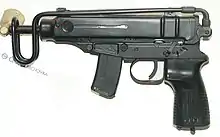
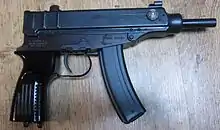
In the 1960s, three other variants of the vz. 61 were developed in Czechoslovakia, though none were mass-produced.
- vz. 64 in .380 ACP (9×17mm Short)
- vz. 65 in 9×18mm Makarov
- vz. 68 in 9×19mm Parabellum
In the 1990s Česká zbrojovka offered the following submachine guns: the vz. 61 E (.32 ACP version with a plastic pistol grip), the vz. 82 (chambered in 9×18mm Makarov and featuring a 113 mm barrel) and the vz. 83 (for the .380 ACP cartridge). A semi-automatic only variant known as the CZ-91S was developed for the civilian market, available in the aforementioned calibers. The vz. 82, vz. 83 and CZ-91S pistols chambered in 9 mm use straight box magazines.
- M84 "ŠKORPION" (М84 "ШКОРПИОН"), licensed and produced by Yugoslavia[8] between 1984 and 1992, then Serbia.
A 22LR conversion kit is also sold commercially.
Users

 Afghanistan[9]
Afghanistan[9] Algeria
Algeria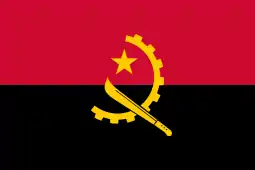 Angola[9]
Angola[9] Czech Republic[9][10][11]
Czech Republic[9][10][11] Egypt[12]
Egypt[12] Georgia[9] Mostly used by Police forces.
Georgia[9] Mostly used by Police forces.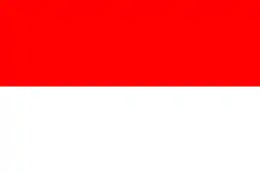 Indonesia: Komando Pasukan Katak (Kopaska) tactical diver group and Komando Pasukan Khusus (Kopassus) special forces group.[13]
Indonesia: Komando Pasukan Katak (Kopaska) tactical diver group and Komando Pasukan Khusus (Kopassus) special forces group.[13] Jordan[14]
Jordan[14] Iraq[14]
Iraq[14] Lebanon[14]
Lebanon[14] Liberia: received Serbian M84s in 2002[15]
Liberia: received Serbian M84s in 2002[15]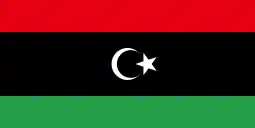 Libya[9]
Libya[9] Mongolia
Mongolia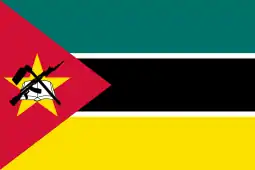 Mozambique[12]
Mozambique[12]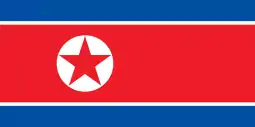 North Korea: Used by spies and special force units[16]
North Korea: Used by spies and special force units[16] Pakistan[9] Used by Dolphin police force
Pakistan[9] Used by Dolphin police force Serbia[12][17]
Serbia[12][17] Slovakia[9]
Slovakia[9]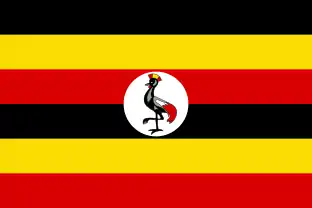 Uganda[9]
Uganda[9] Vietnam
Vietnam
- Defunct
 Czechoslovakia
Czechoslovakia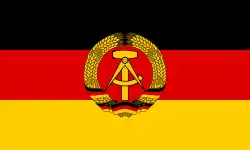 East Germany Used by the East German Nationale Volksarmee (NVA)[18]
East Germany Used by the East German Nationale Volksarmee (NVA)[18] Soviet Union Used by Spetsnaz units[17]
Soviet Union Used by Spetsnaz units[17].svg.png.webp) North Vietnam Used by the North Vietnamese and the Việt Cộng in the Vietnam War.[19]
North Vietnam Used by the North Vietnamese and the Việt Cộng in the Vietnam War.[19].svg.png.webp) Yugoslavia[12]
Yugoslavia[12]
Non-state users;
References
- Archived December 1, 2008, at the Wayback Machine
- Malvenuti, Edoardo (9 March 2014). "Škorpion, bursts of fire and mysteries". Progetto Repubblica Ceca. Progetto Repubblica Ceca. Archived from the original on 13 November 2014. Retrieved 12 November 2014.
- "Military-Today - Sa vz.61 Scorpion Submachine Gun". Archived from the original on 2012-01-20. Retrieved 2012-02-27.
- James, Frank (2004). Effective handgun defence. Krause Publications.
- Warlow, Tom (2004). Firearms, the Law, and Forensic Ballistics (2nd ed.). CRC Press. pp. 77f. ISBN 9780203568224. Archived from the original on 2016-04-28. Retrieved 2016-11-04.
- "Malmöbo pekas ut i jättelik vapenhärva". Sydsvenskan. 18 February 2017. Archived from the original on 28 February 2017. Retrieved 27 February 2017.
- Long, Duncan (1986). Assault Pistols, Rifles, and Submachine Guns. Boulder, Colorado: Paladin Press. p. 18. ISBN 0-87364-353-4.
- "Аутоматски пиштољ 7.65 mm М84 "ШКОРПИОН"". Наоружање Копнене војске: Пешадијско наоружање. Archived from the original on 2016-03-04. Retrieved 2016-02-24.
- Jones, Richard D.; Ness, Leland S., eds. (January 27, 2009). Jane's Infantry Weapons 2009/2010 (35th ed.). Coulsdon: Jane's Information Group. ISBN 978-0-7106-2869-5.
- "7,65mm samopal vzor 61 Škorpión | Armáda". Army.cz. Archived from the original on 2009-02-07. Retrieved 2013-04-22.
- "Rucni Zbrane ACR" (PDF) (in Czech). Army.cz. Archived (PDF) from the original on 2012-02-29. Retrieved 2013-10-24.
- Diez, Octavio (2000). Handguns: Armament and Technology. Lema Publications, S.L. ISBN 84-8463-013-7.
- "Kopassus & Kopaska - Specijalne Postrojbe Republike Indonezije" (in Croatian). Hrvatski Vojnik Magazine. Archived from the original on 2010-08-22. Retrieved 2010-06-12.
- Republic of Serbia: Ministry of Economy and of Regional Development. "Annual Report on the Transfers of Controlled Goods in 2008". p. 37. Archived from the original on 21 December 2014. Retrieved 25 October 2014 – via Stockholm International Peace Research Institute.
- United Nations Security Council (25 Oct 2002). Report of the Panel of Experts concerning Liberia (S/2002/1115) (PDF). p. 18. Archived (PDF) from the original on 29 August 2018. Retrieved 29 August 2018.
- "North Korean Small Arms". Small Arms Defense Journal. Archived from the original on 28 August 2017. Retrieved 9 April 2018.
- "The Czech vz. 61 Skorpion: A stinger full of 32 ACP (VIDEO)". Guns.com. Archived from the original on 2016-02-21. Retrieved 2016-02-13.
- Handwaffen und Panzerabwehrwaffen der Bundeswehr, Jan-Phillipp Weisswange, p.72
- "Samopal vz.61 Škorpion / NAM 64-75". www.nam-valka.cz. Archived from the original on 22 March 2017. Retrieved 9 April 2018.
- Christopher Dobson and Ronald Payne (1982). The Terrorists: Their Weapons, Leaders, and Tactics. Facts on File. p. 103.CS1 maint: uses authors parameter (link)
Sources
- Škorpion: 7,65 mm samopal vz. 61 Škorpion a jeho varianty. NV. 2004. ISBN 978-80-206-0704-1.
External links
| Wikimedia Commons has media related to Sa vz. 61 Škorpion. |
